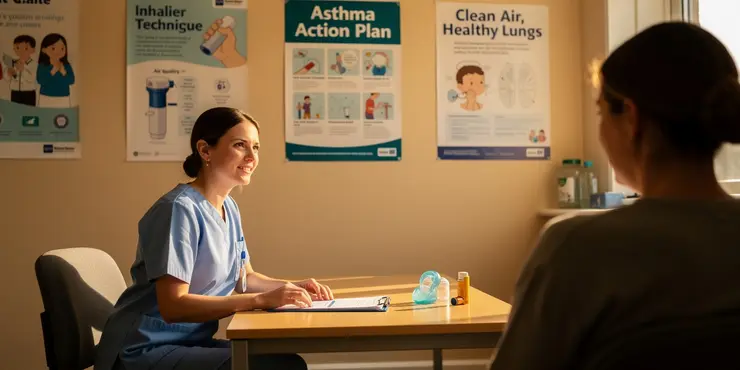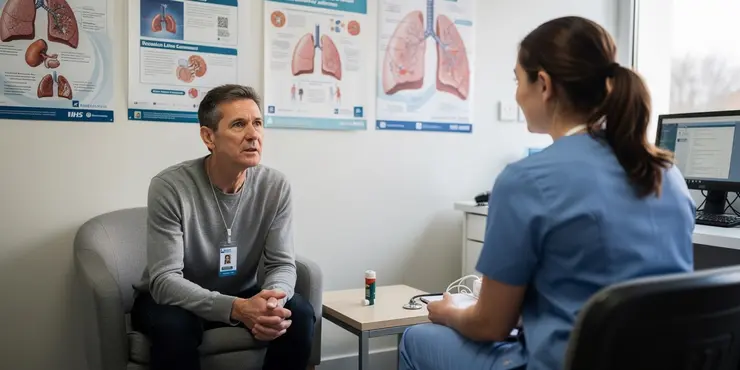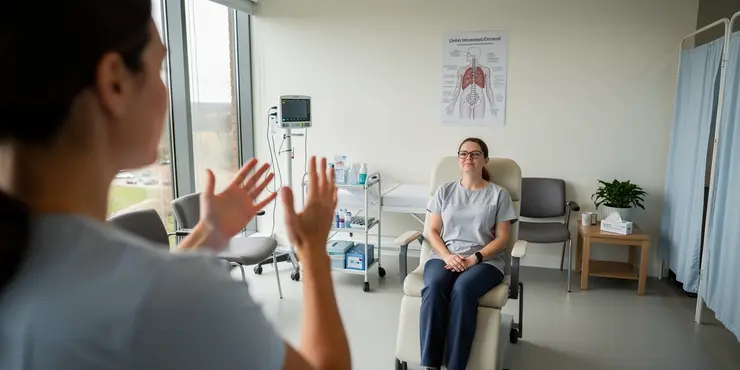
Find Help
More Items From Ergsy search
-

How does air pollution affect asthma?
Relevance: 100%
-

Rise in Childhood Asthma Linked to Air Pollution in Urban Areas
Relevance: 93%
-

Where can I find information on air pollution and its effect on Asthma for my local area?
Relevance: 90%
-

Where can I find research studies on air pollution and asthma in my area?
Relevance: 88%
-

Are there mobile apps to track air quality and its impact on asthma?
Relevance: 78%
-

What are some common pollutants that affect asthma sufferers in urban areas?
Relevance: 76%
-

Air Pollution and Lung Cancer
Relevance: 75%
-

UK Study Links Poor Air Quality to Increased Asthma Cases in Urban Areas
Relevance: 73%
-

High Air Pollution Levels Linked to Rising Cases of Respiratory Issues
Relevance: 69%
-

What local organizations provide information on air pollution and asthma?
Relevance: 67%
-

What local organizations provide information on air pollution and asthma?
Relevance: 67%
-

How can I reduce my exposure to air pollution if I have asthma?
Relevance: 66%
-

Where can I find general information about air pollution and asthma?
Relevance: 64%
-

What causes asthma?
Relevance: 62%
-

What triggers asthma attacks?
Relevance: 61%
-

What is Asthma?
Relevance: 61%
-

Is UK air quality changing?
Relevance: 56%
-

How can asthma attacks be prevented?
Relevance: 56%
-

Is asthma a serious condition?
Relevance: 55%
-

How is asthma treated?
Relevance: 51%
-

Can asthma be cured?
Relevance: 50%
-

Are there different types of asthma?
Relevance: 50%
-

Can exercise trigger asthma symptoms?
Relevance: 48%
-

Are inhalers the only treatment for asthma?
Relevance: 47%
-

How is asthma diagnosed?
Relevance: 46%
-

An Asthma Explainer with Dr Katherine Hickman
Relevance: 46%
-

What is air physiotherapy?
Relevance: 46%
-

Can asthma be fatal?
Relevance: 45%
-

How do I check current air quality levels in my local area?
Relevance: 44%
-

What are the common symptoms of asthma?
Relevance: 43%
-

Does air physiotherapy involve medication?
Relevance: 42%
-

Can stress cause asthma symptoms?
Relevance: 42%
-

Who can benefit from air physiotherapy?
Relevance: 41%
-

Are there any exercises involved in air physiotherapy?
Relevance: 41%
-

Is a prescription needed for air physiotherapy?
Relevance: 41%
-

Can air physiotherapy be done at home?
Relevance: 41%
-

Is there a link between hay fever and asthma?
Relevance: 40%
-

Can dust mites cause asthma and eczema?
Relevance: 40%
-

How does sewage pollution affect public health?
Relevance: 39%
-

Can children outgrow asthma?
Relevance: 39%
Understanding Asthma and Air Pollution
Asthma is a chronic inflammatory disease of the airways that causes difficulty breathing, coughing, shortness of breath, and wheezing. It affects millions of people around the world, including a substantial number in the UK. Air pollution, which is increasingly becoming a concern due to industrial emissions, vehicle exhaust, and other sources, can significantly impact those with asthma.
The Impact of Air Pollution on Asthma
Air pollution can exacerbate asthma symptoms and is recognized as both a trigger for asthma attacks and a factor contributing to the worsening of the condition over time. Common air pollutants that affect asthma sufferers include particulate matter (PM), nitrogen dioxide (NO2), sulfur dioxide (SO2), ozone (O3), and volatile organic compounds (VOCs). These pollutants can irritate inflamed and sensitive airways, causing asthma sufferers to experience more frequent and severe symptoms.
Particulate Matter and Asthma
Particulate matter, especially fine particles smaller than 2.5 microns (PM2.5), can penetrate deep into the lungs and even enter the bloodstream. PM2.5 is primarily produced by vehicle exhaust and industrial processes. Studies have shown that higher levels of PM2.5 are associated with increased hospital admissions for asthma attacks. In the UK, urban areas often experience higher levels of particulate matter, posing a greater risk to those with asthma.
Nitrogen Dioxide and Respiratory Health
Nitrogen dioxide is a common pollutant associated with traffic emissions and fossil fuel combustion. It is known to irritate the lungs and lower resistance to respiratory infections. For individuals with asthma, exposure to high levels of nitrogen dioxide can result in increased frequency of symptoms and attacks. Reducing exposure, particularly in areas with heavy traffic, can help mitigate this risk.
The Role of Ozone
While beneficial in the upper atmosphere, ground-level ozone is harmful to respiratory health. It is formed when sunlight reacts with pollutants like VOCs and nitrogen oxides. Ozone can trigger asthma symptoms and lead to hospitalisations. Efforts to control precursor emissions have been implemented, yet ozone levels can still rise during hot, sunny days, necessitating vigilance among asthma sufferers.
Strategies for Mitigating the Impact
To minimize the effects of air pollution on asthma, individuals can follow several practices. Tracking air quality forecasts and avoiding outdoor activities when pollution levels are high is advisable. Utilising air purifiers indoors and maintaining clean ventilation systems can also help reduce exposure. Advocacy for policies to reduce emissions and improve air quality can lead to longer-term benefits for asthma patients.
Government Initiatives in the UK
The UK government has recognised the impact of air pollution on public health and has implemented measures to address it, including Clean Air Zones and initiatives to reduce vehicle emissions. These measures aim to reduce pollutant levels and protect vulnerable populations, such as those suffering from asthma.
Understanding Asthma and Air Pollution
Asthma is a sickness that makes it hard to breathe. It can cause coughing, trouble breathing, and a wheezing sound when you breathe. Many people around the world have asthma. Air pollution can make asthma worse. Pollution comes from things like factories and cars.
The Impact of Air Pollution on Asthma
Air pollution can make asthma symptoms worse. It can also cause asthma attacks. Some things in the air that can be harmful are dust (called particulate matter), gases like nitrogen dioxide and sulfur dioxide, ozone, and chemicals called volatile organic compounds (VOCs). These can make it harder for people with asthma to breathe.
Particulate Matter and Asthma
Particulate matter is tiny bits of stuff in the air, especially very small pieces called PM2.5. These can get deep into the lungs. They mostly come from car fumes and factories. If the air has a lot of PM2.5, more people might have to go to the hospital because of asthma. Cities often have more of these tiny particles, which can make things hard for people with asthma.
Nitrogen Dioxide and Respiratory Health
Nitrogen dioxide comes from cars and burning fuels. It can irritate the lungs and make it easier to get sick. For people with asthma, breathing in too much nitrogen dioxide can cause more symptoms and asthma attacks. It’s important to stay away from busy roads to avoid breathing in too much of this gas.
The Role of Ozone
Ozone high up in the sky is good, but near the ground, it is bad for breathing. It is made when the sun shines on pollution. Ozone can make asthma symptoms worse and even send people to the hospital. It’s important for people with asthma to be careful on hot, sunny days when ozone levels can go up.
Strategies for Mitigating the Impact
To help asthma, people can do a few things. They can check the air quality forecast and stay inside when pollution is bad. Using air cleaners inside and keeping vents clean can help too. Supporting rules to lower pollution can protect people with asthma in the long run.
Government Initiatives in the UK
The UK government knows that air pollution is bad for health. They have made rules to help, like Clean Air Zones and ways to cut down on car fumes. These efforts are to make the air cleaner and help people with asthma.
Frequently Asked Questions
What is asthma?
Asthma is a chronic lung condition characterized by inflammation and narrowing of the airways, leading to difficulty breathing, coughing, wheezing, and shortness of breath.
How does air pollution affect asthma?
Air pollution can exacerbate asthma by irritating the airways, leading to increased inflammation and narrowing which can trigger asthma symptoms or attacks.
What types of air pollutants are harmful to asthma sufferers?
Common air pollutants that can affect asthma include particulate matter (PM2.5 and PM10), ozone (O3), nitrogen dioxide (NO2), sulfur dioxide (SO2), and volatile organic compounds (VOCs).
Can air pollution cause asthma?
Air pollution is not a direct cause of asthma, but it can contribute to the development of the condition, particularly in people with genetic susceptibility or in children.
What is particulate matter (PM), and why is it a concern for asthma?
Particulate matter consists of tiny particles in the air such as dust, dirt, soot, and smoke. It can penetrate deep into the lungs, worsening asthma symptoms.
How does ozone (O3) affect people with asthma?
Ozone is a potent respiratory irritant that can cause airway inflammation and exacerbate asthma symptoms, especially during the summer months when ozone levels are higher.
Are indoor air pollutants a problem for asthma?
Yes, indoor air pollutants such as tobacco smoke, pet dander, dust mites, mold, and chemical fumes can worsen asthma symptoms.
How can people with asthma protect themselves from air pollution?
People with asthma should monitor air quality forecasts, stay indoors on high pollution days, use air purifiers, and ensure proper ventilation in their homes.
What role does nitrogen dioxide (NO2) play in asthma?
Nitrogen dioxide is a byproduct of combustion processes and can irritate the lungs, leading to increased asthma symptoms in affected individuals.
Is secondhand smoke a significant risk for asthma sufferers?
Yes, secondhand smoke is a major indoor air pollutant that can trigger asthma attacks and worsen symptoms.
Can air pollution affect asthma severity?
Yes, chronic exposure to air pollution can increase the frequency and severity of asthma attacks and potentially lead to a decline in lung function over time.
How does sulfur dioxide (SO2) impact asthma?
Sulfur dioxide is an irritant gas that can cause bronchoconstriction, leading to asthma symptoms like coughing and wheezing.
Can pollen levels affect asthma related to air pollution?
Yes, pollen is a natural airborne allergen that can exacerbate asthma symptoms, especially when combined with air pollution.
Do children with asthma need to be protected from air pollution?
Absolutely, children are more vulnerable to air pollution because their lungs are still developing, and they are often more active outdoors.
How does climate change affect asthma through air pollution?
Climate change can increase the frequency and intensity of air pollution events, such as wildfires and ozone days, worsening asthma symptoms.
Why are traffic emissions a concern for asthma patients?
Traffic emissions contain a mix of pollutants including NO2, PM, and VOCs that can exacerbate asthma symptoms.
Is asthma more prevalent in urban areas with high pollution levels?
Asthma rates are often higher in urban areas with elevated pollution levels due to increased exposure to harmful air pollutants.
How can air quality indexes help asthma patients?
Air quality indexes provide information about daily pollutant levels, allowing people with asthma to plan outdoor activities when air quality is better.
Can long-term exposure to air pollution decrease lung function in asthma patients?
Yes, long-term exposure to high levels of air pollution can lead to decreased lung function and increased risk of asthma-related complications.
What measures can governments take to reduce air pollution and its impact on asthma?
Governments can implement policies to reduce emissions from vehicles and industries, promote the use of clean energy, and enforce air quality standards to protect public health.
What is asthma?
Asthma is a health problem that makes it hard to breathe.
You might cough, wheeze (make a whistling sound) or feel tight in your chest.
If you have asthma, it can help to use an inhaler. An inhaler is a small device that helps you breathe easier.
If you have trouble reading, ask someone to read with you. You can also try reading out loud.
Asthma is a lung problem. It makes it hard to breathe. People with asthma might cough or wheeze. Wheezing is when your breathing makes a whistling noise. Asthma can make you feel out of breath.
How does dirty air affect asthma?
Dirty air can make asthma worse. Asthma makes it hard to breathe, and dirty air can make it even harder.
Some ways dirty air can affect asthma:
- It can make you cough more.
- It can make your chest feel tight.
- It can make you feel out of breath.
To help with asthma when the air is dirty, you can:
- Stay indoors on bad air days.
- Use an air purifier in your home.
- Wear a mask outside to help you breathe better.
Dirty air can make asthma worse. It can bother your lungs and make them swell up. This can make it hard to breathe and cause asthma symptoms or attacks.
What bad stuff in the air can make asthma worse?
If you have asthma, some things in the air can make you feel bad. These are called air pollutants. Here are some you should know about:
- Smoke: This can come from cars, factories, or cigarettes. Avoid places with a lot of smoke.
- Dust: Keep your home clean and dust-free as much as you can.
- Pollen: This comes from plants and trees, especially in spring. Try to stay indoors when there's a lot of pollen outside.
- Strong smells: Things like paint or strong perfumes can bother you. Avoid being close to strong smells.
To help with these, you can:
- Use an air purifier at home.
- Wear a mask when the air quality is bad.
- Stay indoors on very bad air days.
Dirty air can make asthma worse. Here are common things in the air that can be bad:
- Tiny bits of dust called PM2.5 and PM10.
- Ozone, which is a kind of gas.
- Nitrogen dioxide, another kind of gas.
- Sulfur dioxide, also a gas.
- VOCs, which are gases from things like paint or cleaning stuff.
You can use air purifiers to help clean the air at home. Always check air quality reports and stay indoors on bad air days.
Can dirty air make people sick?
Dirty air does not cause asthma. But it can make it more likely in people who get asthma easily, like children or people with asthma in their family.
What is dust in the air, and why is it bad for asthma?
Dust in the air is called "particulate matter" or PM. It is tiny pieces of dirt and stuff that float around in the air.
When people breathe in this dust, it can make it hard to breathe. This is very bad for people with asthma because they already have trouble breathing.
If you have asthma, try to stay away from places with a lot of dust. You can also use a mask to cover your nose and mouth. This helps keep the dust out.
Tiny bits in the air like dust and smoke are called particulate matter. These tiny bits can get into the lungs and make asthma worse.
How does ozone (O3) affect people with asthma?
Ozone is a type of gas in the air.
If you have asthma, ozone can make it hard to breathe.
It might make your chest feel tight or cause you to cough.
Tools like inhalers can help you breathe easier.
Ask an adult or doctor if you need help with asthma.
Stay inside on days when there is a lot of ozone outside.
Ozone can make it hard for you to breathe. It can hurt your lungs and make asthma worse. This happens a lot in the summer when there's more ozone in the air.
Here are some tips to help:
- Stay indoors on days when the air quality is bad.
- Use an air purifier in your home.
- Follow your doctor's advice for asthma care.
Do things in the air inside make asthma worse?
Yes, things in the air inside like cigarette smoke, pet hair, dust bugs, mold, and strong smells from chemicals can make asthma worse.
How can people with asthma stay safe from dirty air?
People with asthma need to be careful about the air they breathe. Here are some easy tips to help:
- Check the air quality: Before you go outside, look at an air quality app or website to see how clean the air is.
- Stay inside on bad air days: When the air is dirty, try to stay indoors where it's safer.
- Wear a mask: A special mask can help keep dirty air out when you need to be outside.
- Use an air purifier: At home, an air purifier can help keep the air clean for you.
- Take your asthma medicine: Always remember to take your medicine to help your lungs stay strong.
These tools can help you breathe better.
If you have asthma, you can do some things to help you feel better. Check the weather for pollution days. Stay inside if there is a lot of pollution. Use machines that clean the air in your home. Make sure fresh air can get into your house.
How does nitrogen dioxide (NO2) affect asthma?
Nitrogen dioxide, or NO2, is a gas in the air.
This gas can make asthma worse.
People with asthma may find it hard to breathe when there is a lot of NO2.
To help, try to stay away from busy roads with lots of cars.
Use a mask if you go to places with lots of traffic and talk to your doctor for more help.
Nitrogen dioxide comes from burning things. It can bother your lungs and make asthma worse for people who have it.
Does breathing in other people's smoke make asthma worse?
Yes, breathing in smoke from other people can make the air inside bad. It can make asthma worse and cause asthma attacks.
Can dirty air make asthma worse?
Breathing dirty air a lot can make asthma worse. It can cause more asthma attacks and make it harder to breathe over time.
How does sulfur dioxide (SO2) affect asthma?
Sulfur dioxide, or SO2, is a gas in the air. Sometimes, it can make breathing hard. This is not good for people with asthma.
Asthma makes it hard to breathe. SO2 can make it worse.
If you have asthma, stay away from busy roads and factories. These places have more SO2.
You can use tools like inhalers to help breathe better if SO2 makes asthma worse. Talk to a doctor for help.
Sulfur dioxide is a gas. It can make breathing tubes smaller. This can make it hard to breathe. People might cough or make a wheezing sound.
Can pollen and air pollution make asthma worse?
Pollen and dirty air can make it hard to breathe. This is called asthma. When pollen levels are high and there's a lot of air pollution, it can make asthma worse.
If you have asthma, it helps to:
- Check the weather for pollen levels.
- Stay indoors when pollen is high.
- Use an air purifier at home.
- Talk to a doctor for help and advice.
Yes, pollen is a tiny thing in the air that can make asthma worse. It can be even worse if the air is dirty.
Do kids with asthma need to stay away from dirty air?
Some kids have a breathing problem called asthma. This means their lungs can get upset easily.
Dirty air can make it hard for kids with asthma to breathe. This is why we need to keep them away from smoke, car fumes, and dust.
Here are some easy ways to help:
- Check the weather news to know when the air is bad.
- Keep windows closed when the air is dirty outside.
- Play indoors when there is lots of smoke or dust outside.
These steps can help kids with asthma breathe easier and stay healthy.
Yes, children can get sick more easily from dirty air. This is because their lungs are still growing, and they play outside a lot.
How does climate change and dirty air harm breathing?
Climate change can make air pollution worse. This means we could have more smoke from wildfires and more days with lots of ozone. This is bad for people with asthma because it can make breathing harder.
Why is car smoke a problem for people with asthma?
Car smoke can make breathing harder for people with asthma.
Here are some ways to understand and manage this:
- Asthma: This is when breathing can be hard sometimes.
- Car smoke: The dirty air from cars and buses.
- Tips to help: Try to stay away from busy roads and use a clean air machine (air purifier) at home.
Car and truck smoke has bad stuff like NO2, PM, and VOCs. This can make asthma worse.
Do more people have asthma in cities with a lot of pollution?
In cities, there is a lot of pollution. This can make asthma more common because the air is not clean.
How can air quality numbers help people with asthma?
Air quality numbers tell us how clean or dirty the air is. This helps people with asthma because:
- It warns them when the air is bad.
- They can stay indoors when the air is unhealthy.
- It helps them avoid places with dirty air.
People with asthma can use apps or websites to check the air quality every day. This keeps them safe and healthy.
Air quality indexes tell us how clean or dirty the air is each day. This helps people with asthma know the best times to play outside when the air is cleaner.
Can breathing dirty air for a long time make it harder for people with asthma to breathe?
Breathing dirty air for a long time can make your lungs work less well. It can also make asthma problems worse.
How can governments help to make the air cleaner and help people with asthma?
Here are some things governments can do:
- Make rules to keep the air clean.
- Help people use buses, trains, and bikes more.
- Plant more trees to clean the air.
- Tell people how to keep the air clean.
These actions can help people breathe better, especially those with asthma.
Governments can make rules to help the air stay clean. They can tell cars and factories to pollute less. They can also support using clean energy, like wind and sun power, and make sure the air is safe for people to breathe.
Tools like colored overlays can help make reading easier. Audiobooks can be a great way to listen and learn too!
Useful Links
This website offers general information and is not a substitute for professional advice.
Always seek guidance from qualified professionals.
If you have any medical concerns or need urgent help, contact a healthcare professional or emergency services immediately.
Some of this content was generated with AI assistance. We’ve done our best to keep it accurate, helpful, and human-friendly.
- Ergsy carfully checks the information in the videos we provide here.
- Videos shown by Youtube after a video has completed, have NOT been reviewed by ERGSY.
- To view, click the arrow in centre of video.
- Most of the videos you find here will have subtitles and/or closed captions available.
- You may need to turn these on, and choose your preferred language.
- Go to the video you'd like to watch.
- If closed captions (CC) are available, settings will be visible on the bottom right of the video player.
- To turn on Captions, click settings .
- To turn off Captions, click settings again.
More Items From Ergsy search
-

How does air pollution affect asthma?
Relevance: 100%
-

Rise in Childhood Asthma Linked to Air Pollution in Urban Areas
Relevance: 93%
-

Where can I find information on air pollution and its effect on Asthma for my local area?
Relevance: 90%
-

Where can I find research studies on air pollution and asthma in my area?
Relevance: 88%
-

Are there mobile apps to track air quality and its impact on asthma?
Relevance: 78%
-

What are some common pollutants that affect asthma sufferers in urban areas?
Relevance: 76%
-

Air Pollution and Lung Cancer
Relevance: 75%
-

UK Study Links Poor Air Quality to Increased Asthma Cases in Urban Areas
Relevance: 73%
-

High Air Pollution Levels Linked to Rising Cases of Respiratory Issues
Relevance: 69%
-

What local organizations provide information on air pollution and asthma?
Relevance: 67%
-

What local organizations provide information on air pollution and asthma?
Relevance: 67%
-

How can I reduce my exposure to air pollution if I have asthma?
Relevance: 66%
-

Where can I find general information about air pollution and asthma?
Relevance: 64%
-

What causes asthma?
Relevance: 62%
-

What triggers asthma attacks?
Relevance: 61%
-

What is Asthma?
Relevance: 61%
-

Is UK air quality changing?
Relevance: 56%
-

How can asthma attacks be prevented?
Relevance: 56%
-

Is asthma a serious condition?
Relevance: 55%
-

How is asthma treated?
Relevance: 51%
-

Can asthma be cured?
Relevance: 50%
-

Are there different types of asthma?
Relevance: 50%
-

Can exercise trigger asthma symptoms?
Relevance: 48%
-

Are inhalers the only treatment for asthma?
Relevance: 47%
-

How is asthma diagnosed?
Relevance: 46%
-

An Asthma Explainer with Dr Katherine Hickman
Relevance: 46%
-

What is air physiotherapy?
Relevance: 46%
-

Can asthma be fatal?
Relevance: 45%
-

How do I check current air quality levels in my local area?
Relevance: 44%
-

What are the common symptoms of asthma?
Relevance: 43%
-

Does air physiotherapy involve medication?
Relevance: 42%
-

Can stress cause asthma symptoms?
Relevance: 42%
-

Who can benefit from air physiotherapy?
Relevance: 41%
-

Are there any exercises involved in air physiotherapy?
Relevance: 41%
-

Is a prescription needed for air physiotherapy?
Relevance: 41%
-

Can air physiotherapy be done at home?
Relevance: 41%
-

Is there a link between hay fever and asthma?
Relevance: 40%
-

Can dust mites cause asthma and eczema?
Relevance: 40%
-

How does sewage pollution affect public health?
Relevance: 39%
-

Can children outgrow asthma?
Relevance: 39%


